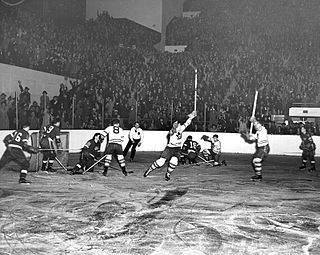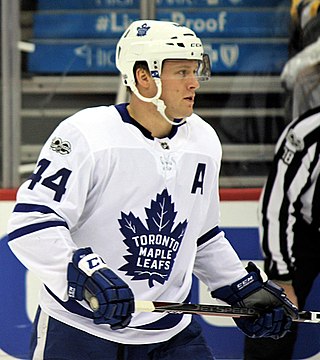Related Research Articles
The National Hockey League All-Star Game is an exhibition ice hockey tournament that is traditionally held during the regular season of the National Hockey League (NHL), with many of the League's star players playing against each other. The game's proceeds benefit the pension fund of the players, and the winning team is awarded $1,000,000 towards a charity of their choice.
The 1985–86 NHL season was the 69th season of the National Hockey League. This season saw the league's Board of Governors introduce the Presidents' Trophy, which would go to the team with the best overall record in the NHL regular season. The Edmonton Oilers would be the first winners of this award.
The 1984–85 NHL season was the 68th season of the National Hockey League. The Edmonton Oilers won their second straight Stanley Cup by beating the Philadelphia Flyers four games to one in the final series.
The 1979–80 NHL season was the 63rd season of the National Hockey League. This season saw the addition of four teams from the disbanded World Hockey Association as expansion franchises. The Edmonton Oilers, Winnipeg Jets, New England Whalers, and Quebec Nordiques joined the NHL, bringing the total to 21 teams. The other two WHA teams were paid to disband.
The 1967–68 NHL season was the 51st season of the National Hockey League. The league expanded to 12 teams, putting the new six in the newly created West Division, while the "Original Six" were all placed in the newly created East Division. The regular season schedule was expanded to 74 games per team and featured the first time all twelve teams played games on the same day on October 18, 1967. The Montreal Canadiens won the Stanley Cup against the new St. Louis Blues, in four games.
William Masterton was a Canadian American professional ice hockey centre who played in the National Hockey League (NHL) for the Minnesota North Stars in 1967–68. He is the only player in NHL history to die as a direct result of injuries suffered during a game, the result of massive head injuries suffered following a hit during a January 13, 1968 contest against the Oakland Seals.
The 1966–67 NHL season was the 50th season of the National Hockey League. This was the last season of only six teams in the NHL, as six more teams were added for the 1967–68 season. This season saw the debut of one of the greatest players in hockey history, defenceman Bobby Orr of the Boston Bruins. The Toronto Maple Leafs defeated the Montreal Canadiens four games to two in the 1967 Stanley Cup Finals to win their thirteenth Stanley Cup in franchise history; to date this was the Leafs' last Stanley Cup victory.
The 1960–61 NHL season was the 44th season of the National Hockey League. The Chicago Black Hawks defeated the Detroit Red Wings in the Stanley Cup Finals four games to two to win the Stanley Cup. It was the first series since 1950 with two American-based teams. It was Chicago's first Cup win since 1938; they would not win another until 2010.
The 1963–64 NHL season was the 47th season of the National Hockey League. Six teams each played 70 games. The Toronto Maple Leafs won their third consecutive Stanley Cup by defeating the Detroit Red Wings four games to three in the final series.
The 1933–34 NHL season was the 17th season of the National Hockey League (NHL). Nine teams each played 48 games. The Chicago Black Hawks were the Stanley Cup winners as they beat the Detroit Red Wings three games to one.
The 1968–69 NHL season was the 52nd season of the National Hockey League. Twelve teams each played 76 games. For the second time in a row, the Montreal Canadiens faced the St. Louis Blues in the Stanley Cup Finals. Montreal won their second consecutive Stanley Cup as they swept the Blues in four, an identical result to the previous season.
The 1969–70 NHL season was the 53rd season of the National Hockey League. For the third straight season, the St. Louis Blues reached the Stanley Cup Finals, and for the third straight year, the winners of the expansion West Division were swept four games to none. This time, however, it was at the hands of the Boston Bruins, as the defending champions Montreal Canadiens narrowly missed the playoffs, something that did not happen again for the next quarter century. With both the Canadiens and Toronto Maple Leafs missing the 1970 Stanley Cup playoffs, it was the first time in league history that no Canadian team in the NHL qualified for the playoffs. It was also the final season that teams wore their colored jerseys at home until the 2003–04 season.
The 1971–72 NHL season was the 55th season of the National Hockey League. Fourteen teams each played 78 games. The Boston Bruins beat the New York Rangers four games to two for their second Stanley Cup in three seasons in the finals.
The 5th National Hockey League All-Star Game took place at Maple Leaf Gardens, home of the Toronto Maple Leafs, on October 9, 1951. Two teams of all-star players played to a 2–2 tie.

The history of the National Hockey League begins with the end of its predecessor league, the National Hockey Association (NHA), in 1917. After unsuccessfully attempting to resolve disputes with Eddie Livingstone, owner of the Toronto Blueshirts, executives of the three other NHA franchises suspended the NHA, and formed the National Hockey League (NHL), replacing the Livingstone team with a temporary team in Toronto, the Arenas. The NHL's first quarter-century saw the league compete against two rival major leagues—the Pacific Coast Hockey Association and Western Canada Hockey League—for players and the Stanley Cup. The NHL first expanded into the United States in 1924 with the founding of the Boston Bruins, and by 1926 consisted of ten teams in Ontario, Quebec, the Great Lakes region, and the Northeastern United States. At the same time, the NHL emerged as the only major league and the sole competitor for the Stanley Cup; in 1947, the NHL completed a deal with the Stanley Cup trustees to gain full control of the Cup. The NHL's footprint spread across Canada as Foster Hewitt's radio broadcasts were heard coast-to-coast starting in 1933.
The Ace Bailey Benefit Game was the first all-star game in National Hockey League (NHL) history. It was played on February 14, 1934, at Maple Leaf Gardens in Toronto to raise money to support Ace Bailey, whose career was ended by a violent hit by Eddie Shore during a game earlier in the 1933–34 season. The Toronto Maple Leafs defeated a team made up of the top players from the rest of the league, 7–3, before a crowd of 14,074 spectators.
The 25th National Hockey League All-Star Game was held in the Metropolitan Sports Center in Bloomington, home of the Minnesota North Stars, on January 25, 1972. It was the first and only time the All-Star Game was held at the Metropolitan Sports Center. The East Division All-Stars defeated the West Division All-Stars 3–2. Bobby Orr was named the game's most valuable player.
The 27th National Hockey League All-Star Game was held in the Chicago Stadium in Chicago, home of the Chicago Black Hawks, on January 29, 1974. It was the second time that the All-Star Game was held in Chicago. The East Division All-Stars defeated the West Division All-Stars 5–4. Garry Unger was named the game's most valuable player.

Morgan Frederick Rielly is a Canadian professional ice hockey defenceman and alternate captain for the Toronto Maple Leafs of the National Hockey League (NHL). He was drafted by the Maple Leafs in the first round, fifth overall, of the 2012 NHL Entry Draft. Before being drafted, Rielly played with the Moose Jaw Warriors of the Western Hockey League. He has represented Canada internationally on several occasions, most notably at the 2016 World Championship, where he won a gold medal.

The Bruins–Maple Leafs rivalry is a National Hockey League (NHL) rivalry between the Boston Bruins and the Toronto Maple Leafs. The teams both compete in the Atlantic Division and with current NHL scheduling, they meet four times per season.
References
- Podnieks, Andrew (2000). The NHL All-Star Game: 50 years of the great tradition. Toronto: HarperCollins. ISBN 0-00-200058-X.
Notes:
- ↑ Podnieks 2000, p. 105.
- 1 2 Podnieks 2000, p. 106.